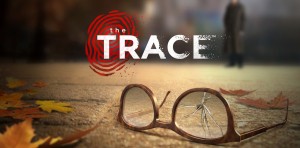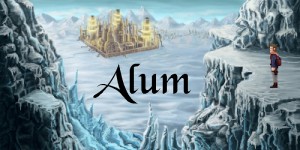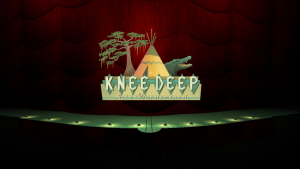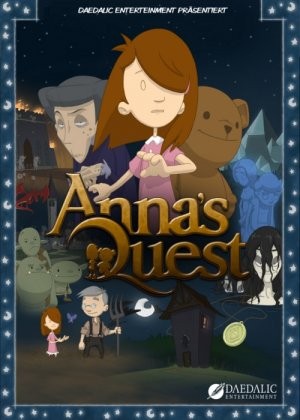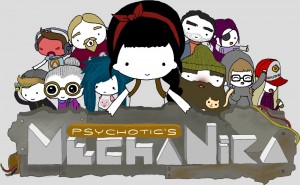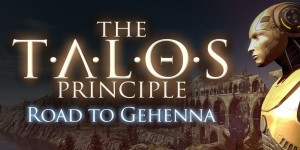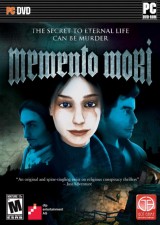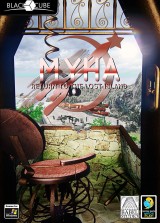Review for McPixel
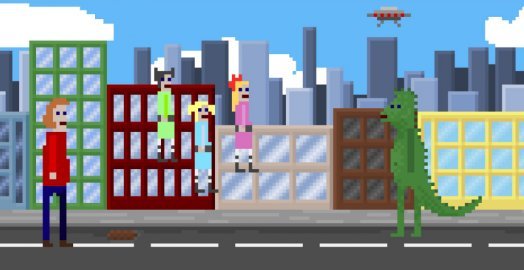
Make a list of the all the worst things about lousy adventures games, and you’ve probably described McPixel: It’s severely timed. It leads to constant failure, death, and restarts. There’s no story or character development. Puzzle solutions are often arbitrary and illogical. Its retro pixel art is so blocky it could scar your retinas even as its repetitive music drives you to delirium. There’s no sense of progression, no ultimate end goal, or really any narrative point at all.
Yes, as far as traditional genre standards go, McPixel gets nothing right whatsoever. So why the heck is it (sometimes) such a hoot?
Doing so much so wrong is entirely intentional, I assure you. It’s clear that indie developer Mikolaj “Sos” Kamiński has taken everything we know and hate about adventure games, churned it up in a blender, and then poured it into a great big bowl of crazy. It’s not a spoof so much as an unapologetically playful celebration of the genre’s sins of yesteryear. And for the most part, it works – except when it doesn’t, or when the novelty begins to fade (and fade quickly). McPixel warns you it’s best played in small doses lest it damage your brain, and it’s not kidding. Fortunately, it’s designed to be played exactly that way, and the entire experience is brief enough that it won’t overstay its welcome, even with a healthy helping of free extras.
To be clear, McPixel really isn’t an adventure game proper. Originally conceived as part of an “escape”-themed Ludum Dare game jam back in 2011, it merely takes the conventions of the genre and applies them to a series of bite-sized levels that the game itself reduces to a lone single-sentence premise: save stuff from blowing up. The why or from whom is of no relevance at all. The only questions that matter are what, where, and when. And the answers to those questions, respectively, are pretty much anything, pretty much anywhere, and right bloody NOW!
Named after its entirely nondescript protagonist, McPixel is divided into four distinct chapters that are hacked up into three rounds apiece, with each round containing a further six levels. There is no connection between any of them except for the final groups of six, which are bunched together to be played in rapid-fire succession. In each individual level you have precisely 20 seconds to prevent an explosion. Whether you succeed or fail, you’re whisked off to the next level immediately after. When you’ve blitzed through all six, you’re then taken back to the beginning to repeat any stages you left a smoking crater the previous time around, and the cycle repeats for as long as it takes to “beat” them all.
Now, 20 seconds may sound like a ridiculously short time, but in the twisted world of McPixel it’s far more than you’ll ever need. With just a single exception late in the campaign, each stage is entirely self-contained and the number of interactive objects is quite limited. More importantly, you’ll often get to perform just a single action before the scenario plays out for better or – usually – worse. On rare occasions, you’ll get two. This is not a game involving complex chains of cause-and-effect.
But perhaps that still sounds needlessly restrictive. How can I assess the clues and deduce a logical solution in that time, you ask? That’s because you’re still thinking like an adventure gamer and not a McPixeler. There really ARE no clues, and often your actions will lead to totally unforeseen results, so advancing in this game comes down largely to trial-and-error-error-and-more-error. While that notion can be infuriating to those of us who lived through the early adventure days of “Hey, I wonder what’s behin…” (Crunch!) “@#$&%!!” (Reload), thankfully McPixel comes from the later “find all the fun ways to die” school of abject failure design.
This no-holds-barred philosophy allows the game to go crazy with its setups. Environments range from carnivals, volcanos and head-banging concerts to spaceships, whale innards and even the depths of hell, to name just a few of the hugely diverse locales. Along the way, you’ll encounter the likes of green-skinned aliens, baby giraffes, shambling mummies, and hook-handed pirates. Tucked in among the many lighthearted riffs are Godzilla, Guy Fawkes, and of course Batman – while the Dark Knight may be the hero McPixel deserves, YOU are the hero it needs right now.
If there’s a downside to the “anything goes” mantra that pervades McPixel, it’s in the illogical nature of how events often play out. Don’t misunderstand me: in this game absurdity is a GOOD thing! Its whole raison d'être is trying things to see what bonkers stuff will happen. But within any game, an internal logic is required in order to make players active participants rather than passive spectators, and many times we’re stuck being the latter here. In one scene, clicking on a visible bomb will result in the protagonist kicking it. (BOOM! Next level.) In another, it’ll cause him to pick it up, ready to do something else with it. How do you know which will happen? You don’t. Clicking another character may result in nothing at all, kicking him or her, or some violently unpredictable equivalent of pulling their bottom lip up and over their head. You won’t even always realize what will cause the explosion. Maybe there’s dynamite stashed away in a locker or hidden panel. Or maybe it’s an exploding chicken. You just never know.
Again, the complaint isn’t that crazy results occur. I’d be far more disappointed if they didn’t. But at least as often as not, what happened was nothing at all like what I’d intended, which continually chipped away my sense of player agency. Rather than solving puzzles, it’s a bit like playing Minesweeper without the strategy: occasionally you get lucky, usually you go kablooie. In this case, sometimes the answer is the most blatantly obvious (if you had any way of knowing how the obvious would turn out) and other times it’s completely nonsensical. The only way to find out is to guess.
Having said that, I can get behind sacrificing strategy for laughs. But McPixel is very much hit-or-miss in the gag department. For every amusing outcome in one level, there’s an equal and opposite “that’s just dumb” counterpart in another. And surprisingly for a game with virtually no rules, several solutions are repeated, many of them involving bodily fluids of one kind or another. So while I applaud the general zaniness thrown against the wall here, a little more thoughtful planning might have resulted in more of it sticking.
From the same decades-old era of insta-death comes McPixel's graphics. The polite way to describe them would be “retro pixel art.” More accurate would probably be “butt-ugly.” Clearly that's intentional, but good Lord it's an eyesore. In almost any other game I’d vehemently condemn such visuals, but here they kind of work, as if a compilation of deleted death scenes from a 1985 adventure that never made the cut. That such a silly game looks silly just doesn’t seem like that big an issue. What can be an issue is that the pixels are SO chunky they occasionally make it hard to make out details, compounded by the lack of any kind of smart cursor. In such sparsely populated screens, random clicking typically isn’t a problem, but once in a while it can add yet another layer to the “what does this do?” confusion that already prevails.
In a nice touch, different graphical settings let you adjust the look, but all these do is essentially put lipstick on a pig (which may be the only thing that doesn’t happen in the game itself). Let’s face it, there’s only so much smooth scaling can do with big, bulky blocks. At the other end of the spectrum, increasing pixel count doesn’t result in a crisper picture, but rather a kind of needlepoint canvas minus only the “Home Sweet Home” stitchwork across the top. They’re fun settings to play with for a few screens, but don’t be surprised if you go back and end up with the default hideousness for the duration.
If the graphics are an affront to one sense, the music is an all-out assault on another. The upbeat 8-bit tune is purposely repetitive, but this is a one-note (almost literally, though not quite) joke that goes on far too long. At first it adds to the ‘80s-style ambience, but about three minutes later you’ll already be looking for sharp objects to pierce your eardrums with to make it stop. There’s no voice acting (or dialogue) or sound effects, however, so there’s no reason not to turn it off completely and listen to something more appealing, up to and including nails on a blackboard.
At less than 20 seconds a pop (more with all the freaking title screens added in between), even with most of them repeated at least once, it won’t take you long to stumble and bumble your way through all 72 levels in the main campaign, chuckling at some, rolling your eyes at others, and gritting your teeth through any that remain. Each of the four chapters has a bonus round that you can access only if you unlock all “gags” throughout its levels (you can replay any level after completing that round). The real bonus, however, comes in the form of the “Free DLC” option, which (at time of writing) adds a staggering 72 more levels, some of them cutely linked thematically with concepts like Christmas, the apocalypse, and classic games like Duck Hunt and Duke Nukem. Most of these are from Sos, though the “indiepaks” from other developers are, sad to say, quite dreadful.
So is McPixel a good game for adventure gamers? It depends on your expectations going in. If you approach it expecting an actual adventure, you will be sorely disappointed. But if you embrace the game as an aesthetically cringeworthy, nudge-wink parody of the genre’s worst features even as it embodies them, there is certainly some engaging fun to be had. Available for PC and mobile devices, this is a one-of-a-kind game, because there can BE only one McPixel – at least until the upcoming sequel. For now, anything more would be overkill. This game kills you enough, if you have the fortitude to experience them all.











